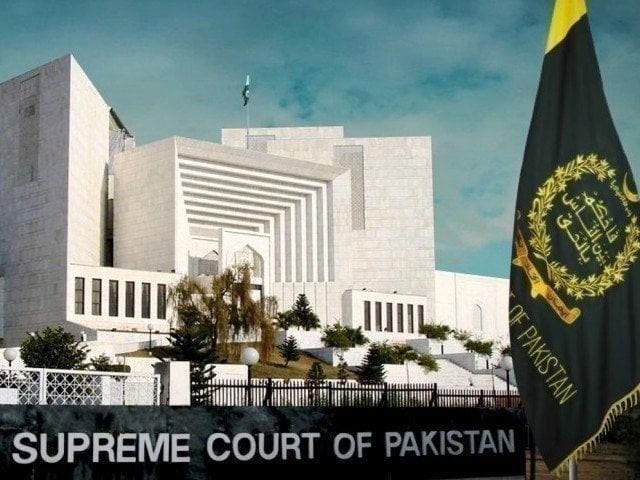SC urges overhaul of death row policies
Calls for laws aligning with international standards to reduce time in death cells

The Supreme Court has called on federal and provincial governments to reconsider their policies, urging the enactment or amendment of laws in line with international standards to minimise the period that death row prisoners spend in death cells.
The apex court's nine-page judgment, authored by Justice Jamal Khan Mandokhail, highlighted the plight of prisoners who, after their death sentences are confirmed by the high court, are often kept in death cells for years or even decades due to delays in the conclusion of criminal proceedings and subsequent execution of their sentences by the executive.
"In a number of cases, we have observed that after confirmation of death sentence by the High Court, the convict(s) are shifted to death cells, where they are kept for years and sometimes for decades, on account of delay in conclusion of criminal proceedings and thereafter, for execution of their sentence by the Executive," the judgment stated.
The court noted that while a convict must face the consequences of a confirmed death sentence, the delay in both criminal proceedings and the execution of the sentence amounts to punishing the individual twice for the same act, which is impermissible under both the law and the injunctions of Islam.
The ruling came in the case of Ghulam Shabbir, a convicted person who has been in prison for 34 years, including 24 years in a death cell. The court, recognising the inhumane conditions and prolonged detention, converted Shabbir's death sentence into life imprisonment.
The top court dismissed his criminal appeal on October 28, 2015, thereby upholding his convictions and sentences. Subsequently, the petitioner filed a criminal review petition, arguing that he had already served his life term and seeking to have his death sentence commuted to life imprisonment.
This review application was accepted on September 19, 2017, with notices issued to the respondents.
After a lapse of seven years, a three-judge bench of the SC, led by Justice Mandokhail, partly granted the review petition, modifying the quantum of the sentence.
"Resultantly, the conviction of the petitioner, Ghulam Shabbir, under section 302(b) PPC is maintained, however, death sentences awarded to him on two counts are converted into imprisonment for life on two counts, with benefit of section 382-B, Code of Criminal Procedure," the court ordered.
The judgment noted the grim conditions in death cells, describing them as miserable and in stark contrast to those of other prisoners, including lifers.
The court criticised the prolonged isolation, lack of privacy, and severe mental stress imposed on death row prisoners, highlighting that these conditions affect not only the prisoners but also their families, who suffer from mental torture.
"The living conditions in death cell are miserable and altogether different from the living conditions of other prisoners, including lifers. In death cell, the convict is under a strict supervision, surveillance and is isolated."
The SC lamented that the space of a cell provided for each condemned prisoner is about 9 x 12 feet, with a single toilet to be used jointly by all the prisoners confined in their respective cells, which compromises their privacy.
Similarly, the prisoner is permitted to go out of the cell twice a day, but only for half an hour each.
Furthermore, the death row prisoner is not permitted to participate in any extracurricular activities, nor is entitled to the benefits and rights available to other prisoners, incarcerated in general prison.
"The convict is forced to live in such an inhuman condition. The date and time of execution of his sentence is uncertain, which in the given circumstance results into horrible feelings and creates anxiety," the ruling noted.
"It is not just the prisoner who suffers, it's the family too, who serves the penalty by way of mental torture, in taking care of him, while incarcerated."
The court noted that the delay of judicial proceedings and execution of the sentence awarded to the petitioner was on account of the system and, hence, was beyond his control.
Due to this hard fact, the petitioner has faced the agony of prolonged criminal proceedings and, hence, is a victim of circumstances, therefore, he cannot be penalised for the act of the court or the executive.
"Awarding death sentence to a person does not mean that he/she be treated inhumanly by keeping them in death cell for long unlimited period of time. All prisoners living in death cell are not only deprived of their constitutional rights, but they also live under mental stress."
Once the judgment attains finality, it must be implemented and executed at the earliest, the SC noted.
The issue of prisoners detained in death cell once came up before the Federal Shariat Court in the case of Dr Muhammad Aslam Khaki, which declared section 30 of the Prison Act, 1894 repugnant to the injunctions of Islam.
"In the said judgment, the Federal Shariat Court has issued certain directives to the Government, but it seems that the said judgment has not been acted upon."
"Even otherwise, to enjoy the equal protection of law and to be treated in accordance with law is an inalienable right of every citizen enshrined in Article 4 of the Constitution of the Islamic Republic of Pakistan, 1973 ('Constitution').
Likewise, the SC noted that Article 14 of the Constitution provides that the dignity of a man shall be inviolable, adding that his conviction does not disentitle him from his constitutional rights.
All the prisoners are subject to prison law and rules in vogue, but these must not be inconsistent with or in derogation of fundamental rights.
"The reality of increased number of cases causes delay in their disposal and it also takes considerable long period of time to execute death sentence, which result in prolonged detention of prisoners, hence, the prisoners spend the best period of their lives in prison. The issue of prisoners came up before the United Nations, which issued the United Nations Standards Minimum Rules for the Treatment of Prisoners ('Nelson Mandela Rules')."
According to Rule 3 of the Nelson Mandela Rules, the conditions of imprisonment should not be used as an additional punishment or aggravate the inherent suffering of detention. Pakistan being a member of the United Nations, ratified the same. The existing prison laws are outdated.
"There is no effort to make them in accordance with the international standard. Even these laws are not properly implemented."
"Prisons should provide an atmosphere to prisoners in order to maintain their human identity and respect, their personal values, especially, a dignity which is their constitutional right, especially those incarcerated in death cells," the order stated.
It is also important to mention here that the president has the power to pardon a death row prisoner, as provided by Article 45 of the Constitution.
A copy of the judgment will be sent to all federal and provincial governments secretaries including the Attorney General for Pakistan and all advocate generals.



















COMMENTS
Comments are moderated and generally will be posted if they are on-topic and not abusive.
For more information, please see our Comments FAQ